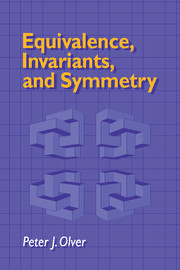Book contents
- Frontmatter
- Contents
- Preface
- Acknowledgments
- Introduction
- 1 Geometric Foundations
- 2 Lie Groups
- 3 Representation Theory
- 4 Jets and Contact Transformations
- 5 Differential Invariants
- 6 Symmetries of Differential Equations
- 7 Symmetries of Variational Problems
- 8 Equivalence of Coframes
- 9 Formulation of Equivalence Problems
- 10 Cartan's Equivalence Method
- 11 Involution
- 12 Prolongation of Equivalence Problems
- 13 Differential Systems
- 14 Frobenius' Theorem
- 15 The Cartan–Kähler Existence Theorem
- Tables
- References
- Symbol Index
- Author Index
- Subject Index
10 - Cartan's Equivalence Method
Published online by Cambridge University Press: 05 August 2012
- Frontmatter
- Contents
- Preface
- Acknowledgments
- Introduction
- 1 Geometric Foundations
- 2 Lie Groups
- 3 Representation Theory
- 4 Jets and Contact Transformations
- 5 Differential Invariants
- 6 Symmetries of Differential Equations
- 7 Symmetries of Variational Problems
- 8 Equivalence of Coframes
- 9 Formulation of Equivalence Problems
- 10 Cartan's Equivalence Method
- 11 Involution
- 12 Prolongation of Equivalence Problems
- 13 Differential Systems
- 14 Frobenius' Theorem
- 15 The Cartan–Kähler Existence Theorem
- Tables
- References
- Symbol Index
- Author Index
- Subject Index
Summary
Once an equivalence problem has been reformulated in the proper Cartan form, in terms of a coframe ω on the m-dimensional base manifold M, along with a structure group G ⊂ GL(m), we are ready to apply the Cartan equivalence method. As remarked in the previous chapter, the goal is to normalize the structure group valued coefficients in a suitably invariant manner, and this is accomplished through the determination of a sufficient number of invariant combinations thereof. The Cartan method provides an algorithmic approach for finding such invariant combinations. Each group-dependent invariant combination allows us to normalize one group parameter. In the favorable cases, we can determine enough different invariant combinations so as to normalize all the group parameters, thereby reducing the structure group to the trivial group {e}. In this case, the equivalence problem has been reduced to an equivalence problem for coframes, which we now know how to solve. In this chapter, we shall describe the basic steps in the Cartan equivalence method, and illustrate its application to a variety of problems, chosen so that a complete normalizing reduction can be successfully implemented. The more complicated cases where the method does not produce a full complement of normalizations for the group parameters will be dealt with in the following two chapters.
The Structure Equations
Consider a coframe ω = {ω1, …, ωm} on the m-dimensional manifold M, which, as in (9.19), we identify with a column vector of one-forms, and associated structure group G ⊂ GL(m).
- Type
- Chapter
- Information
- Equivalence, Invariants and Symmetry , pp. 304 - 346Publisher: Cambridge University PressPrint publication year: 1995



